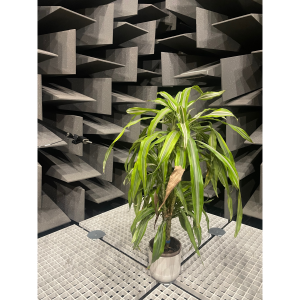Project No. 2459
PRIORITY PROJECT
Primary Supervisor
Prof Tiina Roose – University of Southampton
Co-Supervisor(s)
Dr Katherine Williams – University of Kent
Dr Chaitanya Paruchuri – University of Southampton
Summary
Recent groundbreaking research has unveiled that plants emit sounds in response to various stressors and environmental changes, but the preliminary study lacked precision and control [1].
We aim to use ISVR’s advanced acoustic facilities to delve deeper into this intriguing phenomenon, investigating how plants acoustically respond to both physical (e.g., damage, pest attacks) and chemical hazards (e.g., nutrient enhancement). This research is vital for assessing plant health, particularly in challenging conditions like below-ground pest infestations.
This project will equip you with a diverse skill set encompassing plant biology, acoustics, modeling, artificial intelligence, and engineering methods for noise monitoring and data analysis.
Year 1: To ensure accurate measurements, it’s important to minimize background noise and vibrations as sounds emitted by plants are typically beyond the range of human hearing. Our project aim is to concentrate on alphaalpha plants that have aphid resistant and susceptible plant varieties [2] hence allowing us to compare the noise emanating from two contrasting plant varieties which are both agriculturally important.
Year 2: Measure the noise data under controlled conditions pertaining to physical and chemical hazards[3]. Machine learning techniques can be applied to analyze large datasets of plant emissions. By training algorithms on known patterns, researchers can develop models that automatically detect and classify specific responses or stressors based on the acoustic data.
Year 3 and 4: Identify patterns in plant auditory responses and expand database to include different plant species and stress conditions. Preparing journal publication(s) and present research findings at conferences and collaborate with other well-known experts.
Join us in this pioneering journey, where your contributions will not only shape the future of plant science but also offer a unique platform for personal and professional growth.

